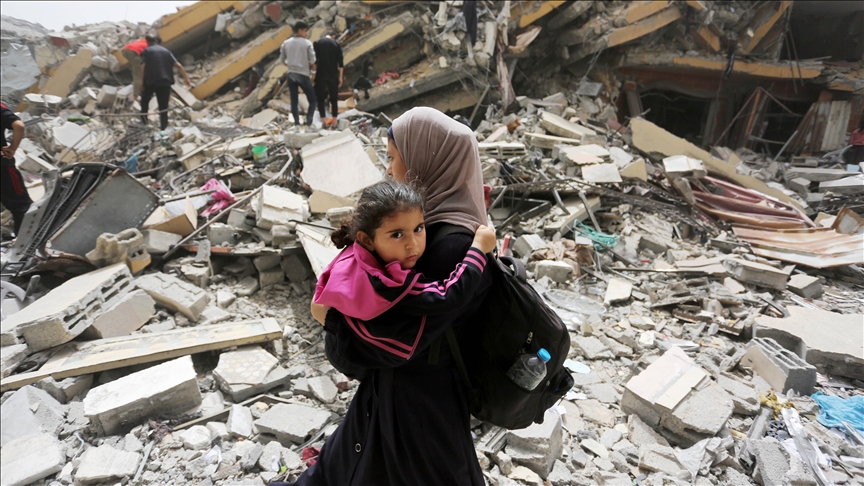The Boycat app helps users help Palestinians by scanning barcodes and finding products and companies that do not fuel Israeli attacks and occupation
Servet Gunerigok |19.04.2024 AA

- 'We created Boycat as an app, one, because we want to obviously help the Palestinian cause,' creator Adil Abbuthalha tells Anadolu
- 'As Palestine is our biggest cause, we want people to only spend money in a certain way that promotes pro-Palestinian (businesses) and ... doesn't allow for the Israeli government and Israeli corporations to see any sort of benefit,' explains Abbuthalha
WASHINGTON (AA)
Amid ongoing Israeli attacks and a soaring death toll nearing 34,000 in under seven months, the repercussions of the conflict in Gaza are felt deeply across the US Muslim community.
Many have been looking for ways to help the Palestinian cause from afar, including via rising calls and action to boycott Israeli goods as well as companies that invest in the country or provide services that support Palestine's occupation.
Adil Abbuthalha is one of those. The creator of an app called Boycat, he is offering a straightforward yet powerful tool for those who want to align their purchasing decisions with their support for Palestine.
Boycat's functionality is simple yet effective.
By scanning product barcodes, users can quickly find out whether the item is associated with companies supporting Israel. If so, the app suggests alternative products from other brands.
The motivation is clear for 26-year-old Abbuthalha, who wants to give users worldwide a way to contribute to the Palestinian cause at an individual level.
"We created Boycat as an app, one, because we want to obviously help the Palestinian cause. That was our biggest opportunity here. We wanted to help do something at an individual level, across the globe," the app founder told Anadolu in an interview.
"Because oftentimes our governments and large corporations, they don't allow us to express ourselves the way we want to and they don't always align with our values. And so we created this application in order to give purchasing power back to the individual, because we noticed that governments and large corporations have one common language, and that was money," he said.
According to Abbuthalha, users must be allowed to choose where they want to spend the money in an ethical way and support the causes they care about.
"Especially right now as Palestine is our biggest cause, we want people to only spend money in a certain way that promotes pro-Palestinian (businesses) and ... doesn't allow for the Israeli government and Israeli corporations to see any sort of benefit," he explained.
Community is at the heart of Boycat's impact. With over 200,000 users in just three months, it has diverted over $4.5 million away from businesses supporting Israel, Abbuthalha said.
"I think touching on community is very important because we want to bring together the community," he added.
In a feature, called Zoomies, that supports local communities, the app connects users with local businesses such as restaurants, cafes, grocery stores, that offer alternatives to boycotted brands.
"For example, we want to boycott Starbucks, McDonald's, and other chains similar to them. And we don't even allow you to direct to those places.
"We just show you that ... these are the alternatives, places that you can go instead. So, maybe there's a Starbucks down the road. But if you walk 20 feet more to the left, there's a local coffee shop you can support instead," he said.
Abbuthalha's inspiration for Boycat came during a moment of despair at the devastation in the Gaza Strip.
"It was in November, Nov. 14 ... We witnessed one month of atrocities in Gaza itself. We saw Israeli bombing like crazy, destroying the cities and everything. And we felt so helpless at that time. That one night on Nov. 14, I had a dream. It's very cheesy, but I had a dream where I was arguing with someone, why they are buying Starbucks. And they basically just said 'there's no alternative and I don't know' that's all they said.
"And I woke up and I just had everything clicked. I just texted the right people and I was like, we need to make a BDS application, make it easy. So we started building in December and then from there we launched in January," he said, referring to the Boycott, Divestment, Sanctions (BDS) movement.
While Boycat is not a cure-all solution, Abbuthalha sees it as a crucial first step.
In essence, Boycat is not about destroying brands but about promoting informed choices and community engagement. As Abbuthalha puts it, "Our goal is to keep expanding ... but ultimately, we don't want to like completely eradicate a brand."
Israel has waged a deadly military offensive on Gaza since an Oct. 7, 2023 cross-border attack by Hamas in which nearly 1,200 people were killed.
More than 33,800 Palestinians, mostly women and children, have since been killed in Gaza, and over 76,600 others injured amid mass destruction and shortages of necessities.
The Israeli war has pushed 85% of Gaza’s population into internal displacement amid acute shortages of food, clean water and medicine, while 60% of the enclave's infrastructure has been damaged or destroyed, according to the UN.
Israel stands accused of genocide at the International Court of Justice. An interim ruling in January ordered Tel Aviv to stop genocidal acts and take measures to guarantee that humanitarian assistance is provided to civilians in Gaza.
No comments:
Post a Comment